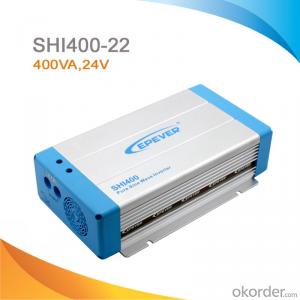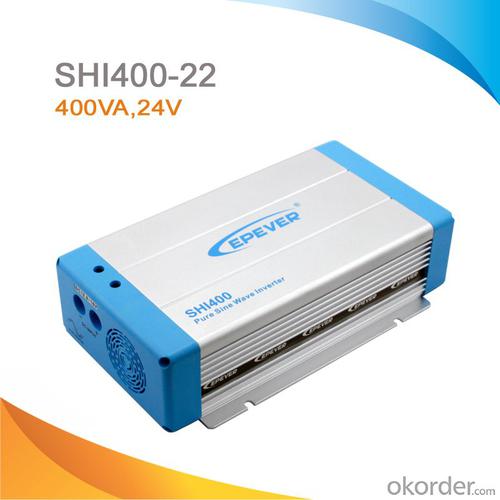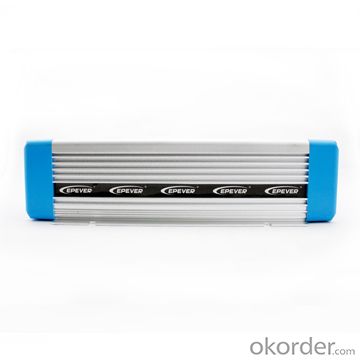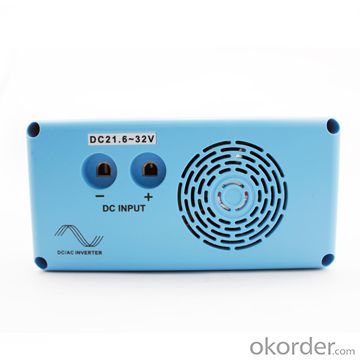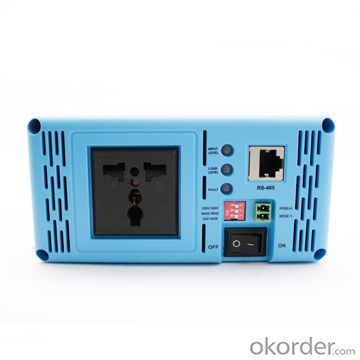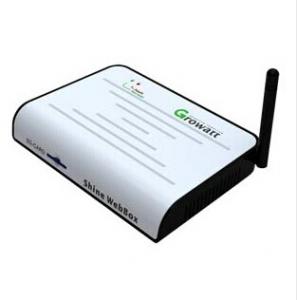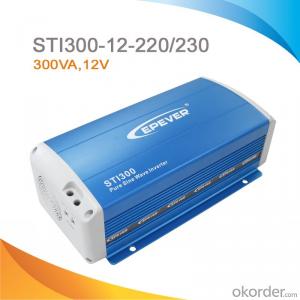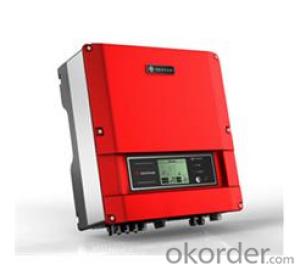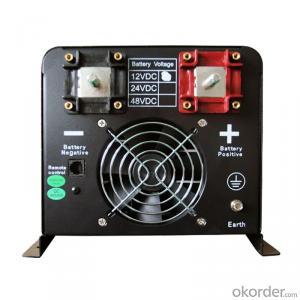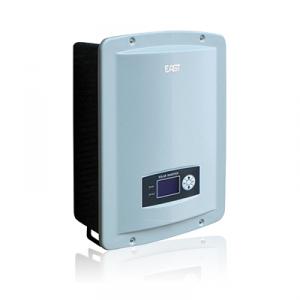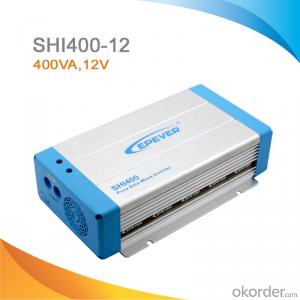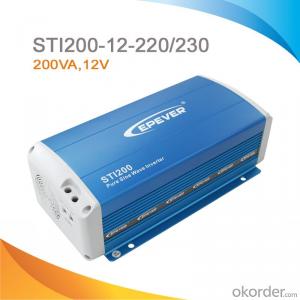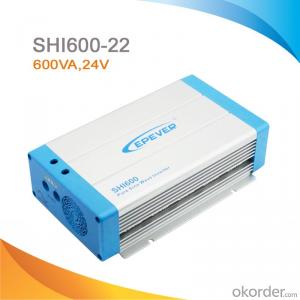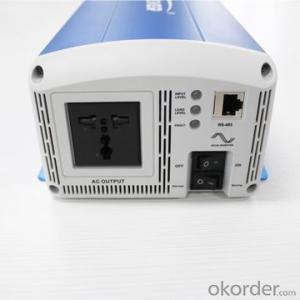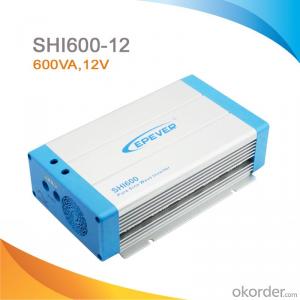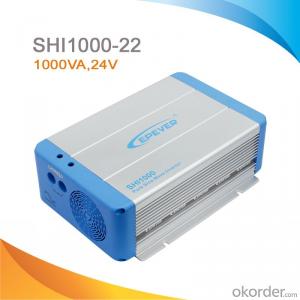35KW Solar Inverter - Off-grid Pure Sine Wave Solar Inverter/Power Inverter 400W, DC 24V to AC 220V/230V SHI400-22
- Loading Port:
- China Main Port
- Payment Terms:
- TT or LC
- Min Order Qty:
- -
- Supply Capability:
- -
OKorder Service Pledge
OKorder Financial Service
You Might Also Like
SHI series is a pure sine wave inverter which can convert 12/24/48Vdc to 220/230Vac 50/60Hz based on full digital and intelligent design. It features high reliability, high efficiency, concise outline, small volume, easy installation and operation. The inverter can be applied in many fields, such as household appliances, electric tools and industrial devices etc, especially for solar photovoltaic power system.
True sine wave inverters produce power that is either identical or sometimes slightly better to power from the public utility power grid system. The power wave when viewed through an oscilloscope is a smooth sine wave.
Features:
·Input & output fully isolation
·Adoption of advanced SPWM technology, pure sine wave output
·Dynamic current loop control technology to ensure inverter reliable operation
·Wide DC input voltage range
·The output voltage and frequency can be switched
·Low output harmonic distortion(THD≤3%)
·LED indicators for input voltage range, load power range, normal output & failure state
·Optional energy saving mode
·Wide working temperature range (industrial level)
·Continuous operation at full power
Protections:
·Output short circuit protection
·Overload protection
·Input low voltage protection
·Input over voltage protection
·Overheating protection
·Inverter abnormal protection
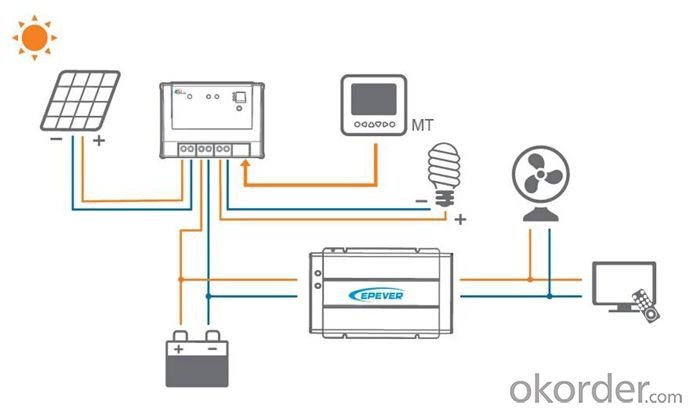
Specification:
Types | SHI400-12 | SHI400-22 | SHI600-12 | SHI600-22 | SHI1000-22 | SHI1000-42 |
Nominal Battery Voltage | 12V | 24V | 12V | 24V | 24V | 48V |
Input Voltage Range | 10.8~16Vdc | 21.6~32Vdc | 10.8~16Vdc | 21.6~32Vdc | 21.6~32Vdc | 43.2~64Vdc |
No Load Current | ≤0.8A | ≤0.45A | ≤0.7A | ≤0.45A | ≤0.45A | ≤0.35A |
Output Wave | Pure Sine Wave | |||||
Output Voltage | 220Vac±3% / 230Vac±10% | |||||
Continuous Power | 400W | 600W | 1000W | |||
Power 10 sec | 600W | 900W | 1500W | |||
Power 1.5 sec | 800W | 1200W | 2000W | |||
Surge Power | 900W | 1350W | 2250W | |||
Frequency | 50/60Hz±0.2% | |||||
Distortion THD | ≤ 3% (resistive load) | |||||
Efficiency at Rated Power | ≥91% | ≥92% | ≥91% | ≥92% | ≥93% | ≥93.5% |
Max. Efficiency | ≥92% | ≥93% | ≥93% | ≥94% | ≥94% | ≥94% |
Terminal | 16mm2 | 25mm2 | 25mm2 | |||
Dimensions | 280×166×74.3mm | 295×186×82mm | 295×208×98mm | |||
Installation | 150×158mm | 150×178mm | 150×200mm | |||
Hole Size | Φ5mm | Φ6mm | Φ6mm | |||
Net Weight | 1.8kg | 2.3kg | 3.3kg | |||
Working Temperature | -20℃~ +50℃ | |||||
Storage Temperature | -35℃~ +70℃ | |||||
Humidity | < 95% (N.C.) | |||||
Altitude | < 5000m(Derating to operate according to IEC62040 at a height exceeding 1000m) | |||||
Insulation Resistance | Between DC input terminals and metal case: ≥550MΩ; Between AC output terminals and metal case: ≥550MΩ. | |||||
Dielectric Strength | Between DC input terminals and metal case: Test voltage AC1500V, 1 minute Between AC output terminals and metal case: Test voltage AC1500V, 1 minute | |||||
- Q: What is the role of a grid connection feature in a solar inverter?
- The role of a grid connection feature in a solar inverter is to enable the solar energy system to connect to the electricity grid. It allows for the transfer of excess energy generated by the solar panels back to the grid, thereby allowing the system to sell the surplus electricity or receive credits for it. Additionally, it ensures that the solar energy system can draw electricity from the grid when solar production is insufficient, ensuring a continuous and reliable power supply.
- Q: Can a solar inverter be used in areas with high levels of electrical noise or interference?
- In areas with high levels of electrical noise or interference, a solar inverter can indeed be utilized. However, it is crucial to verify that the solar inverter is specifically designed and equipped to handle such conditions. Some contemporary solar inverters come with built-in features and technologies that aid in minimizing electrical noise and interference. These features encompass advanced filtering, shielding, and surge protection mechanisms. In addition, employing proper grounding and installation techniques can further diminish the impact of electrical noise and interference on the solar inverter's performance. To ensure compatibility and optimal performance in high-noise environments, it is recommended to seek advice from a professional or the manufacturer of the solar inverter.
- Q: Can a solar inverter be used in harsh weather conditions?
- Yes, solar inverters can be designed and built to withstand harsh weather conditions. Many modern solar inverters are equipped with protective features such as dust and moisture resistance, temperature tolerance, and surge protection. These features make them suitable for operating in extreme temperatures, high humidity, dusty environments, and even during heavy rain or snow. However, it is important to ensure that the chosen inverter is specifically designed for the intended weather conditions to ensure its durability and performance.
- Q: Can a solar inverter be used with a solar air conditioning system?
- Yes, a solar inverter can be used with a solar air conditioning system. The solar inverter helps convert the DC power generated by the solar panels into AC power that is suitable for powering the air conditioning system. This allows for the utilization of solar energy to cool or heat a building, making it an eco-friendly and energy-efficient solution.
- Q: Can a solar inverter be used with a battery backup system?
- Yes, a solar inverter can be used with a battery backup system. A solar inverter is responsible for converting the DC power generated by solar panels into AC power used in our homes. By connecting a battery backup system to the solar inverter, excess solar energy can be stored in batteries for later use, providing power during periods of low or no sunlight, such as at night or during power outages.
- Q: Can a solar inverter be used with a monitoring system?
- Yes, a solar inverter can be used with a monitoring system. In fact, many solar inverters come with built-in monitoring capabilities, allowing users to track and analyze the performance of their solar energy system in real-time. Additionally, there are also external monitoring systems available that can be connected to the solar inverter to provide more detailed data and insights on energy production, consumption, and system efficiency.
- Q: How does a solar inverter handle voltage fluctuations in the grid?
- A solar inverter handles voltage fluctuations in the grid by continuously monitoring the grid voltage. When the voltage exceeds or drops below the acceptable range, the inverter adjusts the power output of the solar panels accordingly. It stabilizes the voltage by regulating the flow of electricity from the solar panels, ensuring a consistent and safe supply of power to the grid.
- Q: How is a solar inverter connected to the solar panels?
- A solar inverter is connected to solar panels through a direct current (DC) input from the panels, which is then converted into alternating current (AC) output by the inverter.
- Q: Can a solar inverter be used in extreme weather conditions?
- Yes, solar inverters are designed to withstand extreme weather conditions. They are built to be durable and resistant to factors such as temperature fluctuations, humidity, and harsh weather elements. However, it is always recommended to consult the manufacturer's guidelines to ensure proper installation and protection measures are in place for specific weather conditions.
- Q: What is the role of a solar inverter in anti-islanding protection?
- The role of a solar inverter in anti-islanding protection is to detect when there is a loss of utility power and to disconnect the solar system from the grid. This is important to prevent the system from continuing to generate power during a power outage, which could pose a safety risk to utility workers who may be working on the grid. The solar inverter ensures that the solar system is synchronized with the grid and only operates when there is a stable utility power supply, thus providing a reliable and safe connection to the grid.
Send your message to us
35KW Solar Inverter - Off-grid Pure Sine Wave Solar Inverter/Power Inverter 400W, DC 24V to AC 220V/230V SHI400-22
- Loading Port:
- China Main Port
- Payment Terms:
- TT or LC
- Min Order Qty:
- -
- Supply Capability:
- -
OKorder Service Pledge
OKorder Financial Service
Similar products
Hot products
Hot Searches
Related keywords
